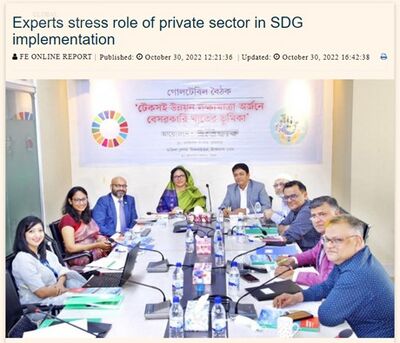Tobacco Industry Interference in South Asia - October 2022
Contents
Background
This is the fifth of the monthly page series that summarises tobacco industry interference and their activities reported during the previous month in the South Asian region. When relevant, this series will feature the cannabis industry as well, as it is majorly backed by the tobacco industry. South Asia includes eight (8) countries, namely, Afghanistan, Bangladesh, Bhutan, India, Maldives, Nepal, Pakistan and Sri Lanka. This page is a compilation of the data from the investigative research findings of CCT Centre for Combating Tobacco (CCT), in partnership with the South Asian Regional Consortium Centre for Combating Tobacco (SARC-CCT). This page will be continuously updated as and when incidents related to the respective month are reported.
The Country Summary
Table 1 summarises tobacco and cannabis industry interference and activities reported according to the country during the month of October 2022.
Table 1: Summary of reported tobacco and cannabis industry interference
| Reported Countries | Tobacco Company | Number of Incidents | |
|---|---|---|---|
| Afghanistan | - | 0 | |
| Bangladesh | [ https://www.tobaccounmasked.com/index.php/British_American_Tobacco_(BAT) British American Tobacco (BAT)] | 2 | |
| Vape traders of Bangladesh | 1 | ||
| Japan Tobacco International (JTI) | 1 | ||
| Media | 1 | ||
| Bhutan | - | 0 | |
| India | ITC Limited India | 2 | |
| IPM India Wholesale Trading Private Limited | 1 | ||
| Maldives | - | 0 | |
| Nepal | - | 0 | |
| Pakistan | - | 0 | |
| Sri Lanka | - | 0 | |
The details of the reported incidents are mentioned below:
Afghanistan
No incidents reported for this month.
Bangladesh
- Media reported that Sheikh Sabab Ahmed, Head of the external Affairs of British American Tobacco Bangladesh (BATB) participated in a “roundtable discussion on implementation of Sustainable Development Goals (SDG)”. Zuena Aziz, the Chief Coordinator for SDG Affairs in the Prime Minister's Office was the chief guest of the event and she stressed the importance of contribution of the private sector in the process of SDG implementation (Image 1).[1]
- Article 5.3 of Framework Convention on Tobacco Control (FCTC) states that “Any interaction with the tobacco industry should serve as a means for exchange of information, but should occur in such a way as to avoid the creation of any perception of a real or potential partnership or cooperation resulting from, or on account of, such interaction”. Sustainable Development Goal 3 on "Good Health and Well-being" targets include reduction of mortality from non-communicable diseases and implementation of FCTC in all countries. Thus, tobacco industry should not take part in discussions related to SDG implementation because of their irreconcilable conflict of interest on the issue.[2]

- British American Tobacco Bangladesh (BATB) published a half a page advertisement in the Samakal newspaper on 1st October 2022 on their project titled “Probaho”. According to the BATB, Probaho is a project to supply clean drinking water to the community.[3][4][5]
- Tobacco companies are well known for their involvement in Corporate Social Responsibility (CSR) activities in order to gain leverage in interference in tobacco control actions and policies and also to whitewash their image and reputation. Article 5.3 of Framework Convention on Tobacco Control (FCTC) recommends to denormalise and regulate activities described as “corporate social responsibility” by the tobacco industry. Tobacco advertising and promotion in print and electronic media is banned by the Smoking and Usage of Tobacco Products (Control) Act 2005 in Bangladesh. However, it doesn’t cover the ban of CSR activities.
- Media reported that the new tobacco control law amendments will directly affect the livelihoods of more than three million shop owners and small traders while the government losing a large amount of tax. According to Tobacco Industry Watch Bangladesh, it is a part of the paid media campaign backed by the tobacco industry against the new tobacco control amendments. [6] [7]
- Commissioning media is a well-known tactic of the tobacco industry aiming to confuse policymakers and the public and interfering in effective tobacco control measures. In Sri Lanka a similar incident happened with the “Tobacco Retailers Association” (TRA). TRA met the Minister of Finance in 2017 and opposed the proposed ban on single stick sales of cigarettes. For more details, visit our page Tobacco Retailers’ Association Opposing Tobacco Regulations in 2017.
- Japan Tobacco International (JTI) reportedly promoted its upcoming brand Camel in tobacco sales outlets using colorful stickers mentioning “World-Conquering Brand in Bangladesh: Coming Soon”. The sticker contained a QR code which directs to a video infographic promoting Camel cigarettes.[8]
- Tobacco advertising and promotion in print and electronic media is banned by the Smoking and Usage of Tobacco Products (Control) Act 2005 in Bangladesh including promotion at the point of sale.
- Vape traders in Bangladesh reportedly campaigned in social media via a Facebook group named as Voice of Vapers against proposed new tobacco control law amendments. Proposed amendments include banning e-cigarettes.[9][10]
Bhutan
No incidents reported for this month.
India
- IPM India Wholesale Trading Private Limited (IPM India) was awarded as the India’s Best Workplaces for Women by Great Place to Work India (Image 2). IPM India is a joint venture between Philip Morris International, Switzerland, Godfrey Phillips India and K.K. Modi Investment and Financial Services Private Limited. Godfrey Phillips India and K.K. Modi Investment and Financial Services Private Limited are under the Modi Enterprises, a group of industries based in New Delhi, India. [11] Great Place to Work is mentioned as ‘the global authority on building, sustaining and recognizing High-Trust, High-Performance Culture at workplaces’ in their website.

- ITC Fiama, personal care brand of ITC Limited India, partnered with NielsenIQ, a market research company headquartered in United States for a mental well-being study for the second consecutive year. The findings of the study was launched on 10th October 2022 reporting that work was the main cause of the stress among the youth in India and the relationships were the prominent cause of stress among men.[12]
- Tobacco companies propagate the idea that individuals tend to smoke to cope with stress as a marketing tactic. In contrary, scientific evidence proves that tobacco smoking negatively impacts mental health causing mental health problems including addiction, depression, anxiety and schizophrenia.
- ITC Limited India announced a growth of net profit by 24% to INR 4619.77 crore (approx. USD 565.5 million) compared to same quarter of the year 2021. Revenue growth from the cigarette sector is 23.3% compared to same quarter of the year 2021 and the actions of the enforcement agencies to contain illicit trade was stated as the reason. In addition, it was reported that the growth of agriculture business sector was mainly from the export of wheat, rice and tobacco leaves.[13]
Nepal
No incidents reported for this month.
Maldives
No incidents reported for this month.
Sri Lanka
No incidents reported for this month.
Other Pages in the Series
- Tobacco Industry Interference in South Asia - June 2022
- Tobacco Industry Interference in South Asia - July 2022
- Tobacco Industry Interference in South Asia - August 2022
- Tobacco Industry Interference in South Asia - September 2022
TobaccoUnmasked Resources
- British American Tobacco (BAT)
- ITC Limited India
- Framework Convention on Tobacco Control (FCTC)
- FCTC Article 5.3
Notes
- ↑ 1.0 1.1 The Financial Express. Experts stress role of private sector in SDG implementation, 30 October 2022, accessed November 2022
- ↑ The Global Goals. Good Health and Well-Being, undated, accessed January 2023
- ↑ Tobacco Industry Watch. BATB Promoting Itself in the Name of CSR, September 2022, accessed November 2022
- ↑ British American Tobacco. 10 years of our Probaho clean water initiative, 8 August 2019, accessed November 2022
- ↑ samakal.com e-paper, 1 October 2022, accessed November 2022
- ↑ ZB Liaquat. Tobacco industry says new law will affect 3 million livelihoods, 6 October 2022, accessed December 2022
- ↑ Tobacco Industry Watch BD. Public Health on Top, October 2022, accessed December 2022
- ↑ Tobacco Industry Watch BD. JTI Violating TC Law, October 2022, accessed December 2022
- ↑ Tobacco Industry Watch BD. Vape Groups Campaigning to Prevent TC Law Amendment, October 2022, accessed December 2022
- ↑ Facebook. VoV Bangladesh, 27 October 2022, accessed December 2022
- ↑ 11.0 11.1 CRN Team. IPM India recognized by Great Place to Work as one of India’s best workplaces for women, 2 October 2022, accessed November 2022
- ↑ The Economic Times. ITC Fiama mental well-being survey 2022: 87% GenZs feel relationships are the biggest cause of stress, 17 October 2022, accessed November 2022
- ↑ M Sen. ITC Q2 profit rises 24% to ₹4,620 cr, beats estimates as cigarette and snacks sales rise, 20 October 2022, accessed November 2022
